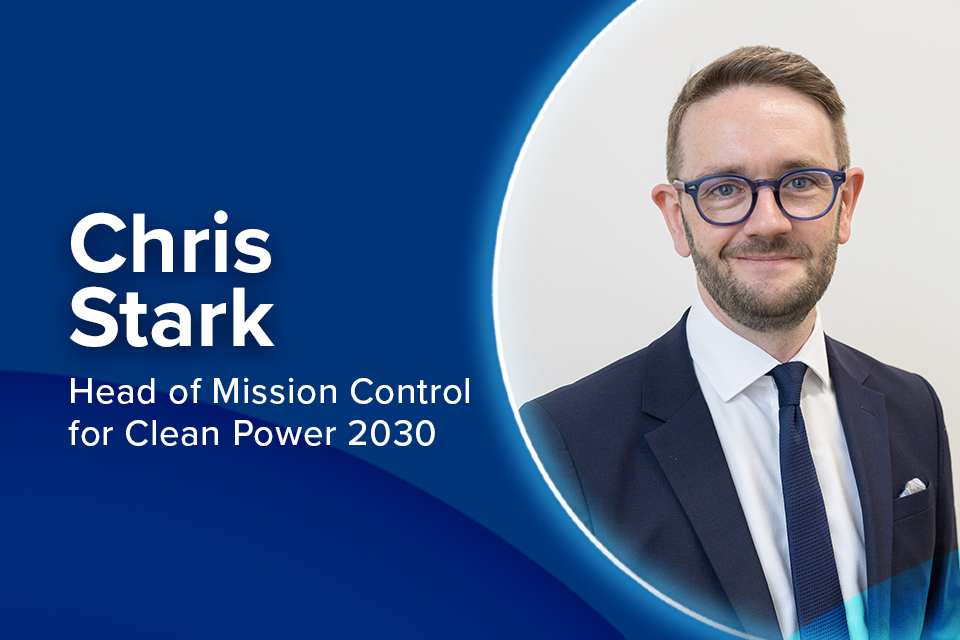- Climate and energy expert and former chief executive of the Climate Change Committee, Chris Stark, appointed to lead control centre tasked with delivering clean power mission by 2030
- Under Chris Stark’s leadership, a top team of energy experts will break down barriers and accelerate progress on energy projects
- Energy Secretary Ed Miliband also asks the Electricity System Operator – soon to be the National Energy System Operator – to provide independent advice on the pathway to 2030
Chris Stark will lead a new control centre to turbocharge the government’s mission to provide Britain with cheaper and clean power by 2030, Energy Secretary Ed Miliband announced today (Tuesday 9 July).
This new Mission Control will be the first of its kind in government, with a relentless focus on accelerating the transition away from volatile fossil fuel markets to clean, homegrown power, to boost Britain’s energy independence and cut bills for the British people.
Mission Control will be a one-stop shop, bringing together a top team of industry experts and officials to troubleshoot, negotiate and clear the way for energy projects.
It will work with key energy companies and organisations including the regulator Ofgem, the National Grid and the Electricity System Operator to remove obstacles and identify and resolve issues as they arise. This will speed up the connection of new power infrastructure to the grid, and cleaner, cheaper power to people’s homes and businesses.
As former chief executive of the Climate Change Committee, and former Director of Energy and Climate Change in the Scottish Government, Chris Stark will bring extensive expertise working with the energy sector to remove barriers and achieve the clean power mission on the country’s path to net zero.
Energy Security and Net Zero Secretary Ed Miliband said:
Years of underinvestment has left our country suffering energy insecurity, with working people paying the price through their energy bills and a cost-of-living crisis.
That cannot happen again. This new Mission Control centre, benefitting from the expertise and experience of Chris Stark’s leadership – and bringing together the brightest and best in the national interest – will have a laser-like focus on delivering our mission of clean power by 2030.
Making Britain a clean energy superpower will not only keep bills down, it will also create hundreds of thousands of good jobs, while protecting national security by keeping dictators out of our energy markets. And, of course, it will allow us to play a leading role in tackling the climate crisis.
Chris Stark, head of the new Mission Control for clean power 2030, said:
Tackling the climate crisis and accelerating the transition to clean power is the country’s biggest challenge, and its greatest opportunity.
By taking action now, we can put the UK at the forefront of the global race to net zero – driving down our carbon emissions but also cutting bills for households.
It is a privilege to head up this work alongside the country’s top energy experts who will make this mission a reality.
To achieve clean power by 2030 – and with it, boost energy independence and lower bills – the Energy Secretary has also asked the Electricity System Operator to provide advice on the pathway towards the 2030 ambition, with expert analysis of the location and type of new investment and infrastructure needed to deliver it.
Fintan Slye, CEO of the Electricity System Operator, said:
I am excited to work with the Secretary of State on the blueprint for the future of our power system.
I also look forward to working with industry and stakeholders across Great Britain as we undertake this critical analysis.
The launch of Mission Control comes alongside the work of Great British Energy – a new company to be owned by the British people, with new infrastructure by the British people, delivering power back to the British people.
It will help the UK take back control of its energy system, in order to cut bills and protect consumers, create good jobs across the country and tackle the climate crisis.
Notes to editors
Chris Stark biography
Chris Stark was chief executive of the Climate Change Committee from April 2018 for 6 years. Under his leadership the committee recommended a UK net zero target for greenhouse gas emissions by 2050 – a target that is now in law. He was Director of Energy and Climate Change in the Scottish Government from May 2016 to April 2018.
He has served as chief executive of the Carbon Trust, and is currently Honorary Professor at the University of Glasgow’s Centre for Public Policy, a Fellow of the Royal Society of Edinburgh and on the board of climate charity Murmer.
Mission Control for Clean Power
The Mission Control for Clean Power under Chris Stark’s leadership will focus on 4 strands of activity, including:
- setting and tracking the overall approach to delivering 2030 across the energy system
- real time monitoring of progress on UK infrastructure projects critical to 2030
- acting as an innovation centre by encouraging discussion among experts
- serving as a convener for the Mission Control approach across government and with industry
National Energy System Operator
We are working closely with Ofgem, as well as with National Grid, the Electricity System Operator and National Gas Transmission, to implement NESO and ensure a smooth transition. We are still aiming for NESO to be established in 2024, subject to a number of factors, including agreeing timelines with key parties.
The legal framework for NESO, including its duties and functions, remain within the Energy Act 2023. We intend to proceed with the policy and organisational design of NESO, including:
- NESO taking on all the existing functions of ESO, alongside strategic gas roles and further new whole system roles
- NESO being established as a public corporation, with operational independence from government
- NESO being licensed and regulated by Ofgem, and funded by consumers through price control arrangements

